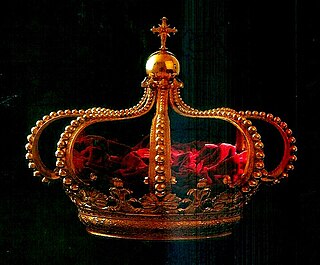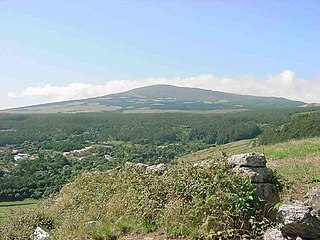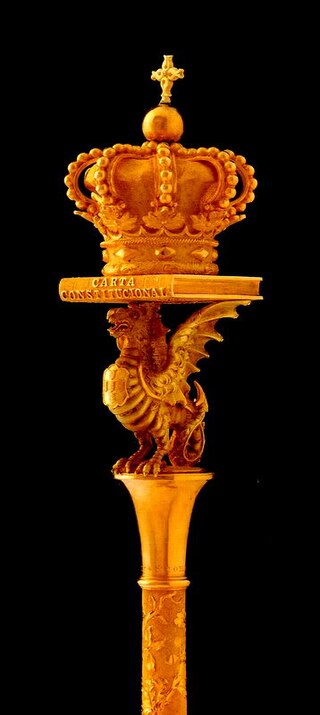External links
- (in Portuguese) As Joias da Coroa, the book
As Joias da Coroa is a novel written by the Brazilian writer Raul Pompeia. It was first published in 1882. It has been published in Portuguese and Italian.

Flores Island is an island of the Western Group of the Azores.

Raul d'Ávila Pompeia was a Brazilian novelist, short story writer and chronicler. He is famous for the Impressionist romance O Ateneu.
The Pataxó are an indigenous people in Bahia, Brazil with a population of about 11,800 individuals. They once spoke the Pataxó language, but now speak Portuguese and a revitalized version of the Pataxó language called Patxohã. The Pataxó's territory is part of a wider region traditionally inhabited by the group. The region was mainly converted into private farms by settlers who persecuted the Pataxó, and in 1961, they were expelled from the largest remaining forest and integrated into the dominant society, losing their indigenous identity and settling in cities. Others moved to coastal areas, forming new indigenous villages, including Coroa Vermelha, founded in 1972 and now home to approximately 6,000 people. In 1998, a group of Pataxó women created the Jaqueira Reserve, which comprises 827 hectares in the Environmental Protection Area of the Coroa Vermelha Indigenous Territory in South Bahia, where they operate a community-based cultural identity and ecotourism project, the Associação Pataxó de Ecoturismo, which employs indigenous families.

Estádio Municipal Alberto Oliveira, usually known as Estádio Joia da Princesa, is a multi-use stadium in Feira de Santana, Brazil. It is currently used mostly for football matches. The stadium holds 16,274. It was built in 1953.Bahia de Feira, Feirense and Fluminense de Feira play their home games at the stadium. Palmeiras Nordeste also played at the stadium

Da Vinci is a Portuguese band created by Iei-Or and Pedro Luís Neves, whose members included Ricardo, Joaquim Andrade, Dora and Sandra Fidalgo, among others throughout the years. Since Ricardo had a plane accident, he was replaced by Tó.
The Brava Island League is a regional championship played in Brava Island, Cape Verde. The championships are organized by Brava Regional Football Association. The winner of the championship plays in the Cape Verdean football Championships of each season.

The Crown of João VI, also known as the Portuguese Royal Crown is the most recent and only extant crown of the Portuguese Crown Jewels.
São José da Coroa Grande is a city in Pernambuco with 21,586 inhabitants. It is southernmost city of the state on the coast section.

Carolina Dieckmann Worcman is a Brazilian actress. She has acted in telenovelas since 1993. A 2004 article in the Women's Wear Daily described Dieckmann as one of the "fastest-rising actresses" in Brazil.

Serra de Santa Bárbara is the peak of an inactive volcano in the western part of the island of Terceira, Azores, Portugal. At 1,021 m (3,350 ft) elevation, it is the highest point of the island. It is named after the village located on the coast to the south, Santa Bárbara in the municipality of Angra do Heroísmo.

Ricardo da Silva Tavares Pereira is a Portuguese actor, model and television presenter.

The Portuguese crown jewels, also known as the Royal Treasure, are the pieces of jewelry, regalia, and vestments that were used by the Kings and Queens of Portugal during the time of the Portuguese Monarchy. Over the nine centuries of Portuguese history, the Portuguese crown jewels have lost and gained many pieces. Most of the current set of the Portuguese crown jewels are from the reigns of King João VI and King Luís I.

The Sceptre of the Armillary, also known as the Sceptre of the United Kingdom of Portugal, Brazil, and the Algarves, is a piece of the Portuguese Crown Jewels, originally created for the acclamation of King João VI, alongside the Crown of João VI and the Mantle of João VI.

The Mantle of João VI, also known as the Mantle of the United Kingdom of Portugal, Brazil, and the Algarves, is the royal robe, a part of the Portuguese Crown Jewels, that was fashioned for the acclamation of King João VI, alongside the Crown of João VI and the Sceptre of the Armillary.

The Sceptre of the Dragon, also known as the Sceptre of the Crown and Constitution, is a piece of the Portuguese Crown Jewels, originally created for the acclamation of Queen Maria II.

The Mantle of Luís I, also known as the Mantle of the Constitutional Kings, is the royal robe, a part of the Portuguese Crown Jewels, that was fashioned for the acclamation of King Luís I, though used by all Portuguese monarchs after him.

The Diadem of the Stars is a Diamond Tiara originally commissioned by Queen Consort Maria Pia of Savoy, who had a love for jewellery and fashion. It is a piece of the Portuguese Crown Jewels.

Joia Rara is a Brazilian telenovela produced and broadcast by TV Globo originally ran from 16 September 2013 to 4 April 2014.
Grupo Desportivo Coroa da Brava or Desportivo Coroa is a football (soccer) club that currently plays in the Brava Island League in Cape Verde. It is based in Nossa Senhora do Monte and plays in Estádio Aquiles de Oliveira in Nova Sintra with a capacity of 500.

The Imperial Scepter, is a piece of the Brazilian Crown Jewels, originally created for the acclamation of Emperor Pedro I of Brazil.